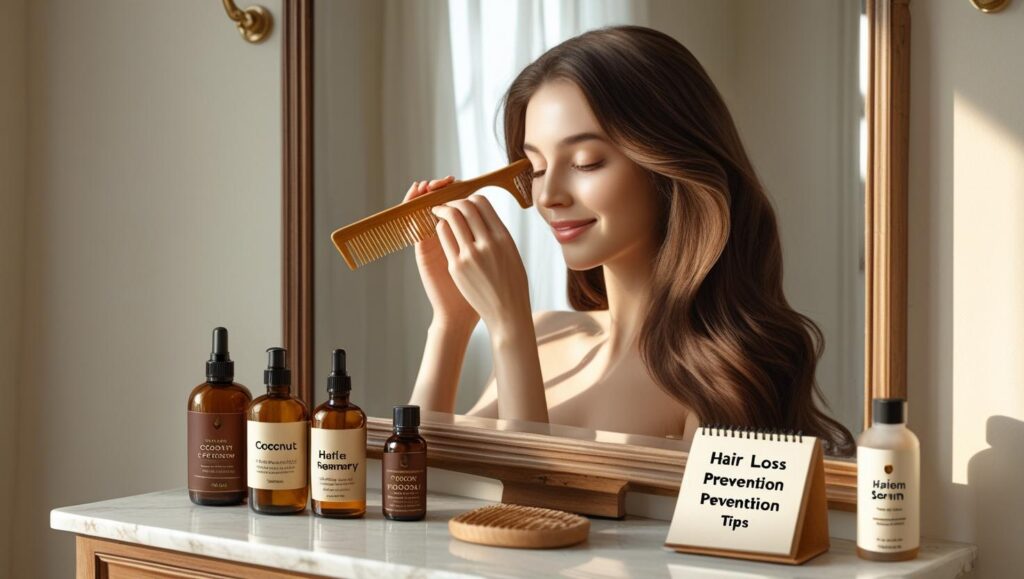Hair loss is a common concern affecting millions of people worldwide. Whether due to genetics, stress, poor nutrition, or medical conditions, losing hair can be distressing. The good news is that many cases of hair loss are preventable with the right care and lifestyle changes.
In this guide, we’ll explore the causes of hair loss, effective prevention strategies, and natural remedies to keep your hair healthy and strong.

Understanding Hair Loss: Common Causes
Before diving into prevention methods, it’s essential to understand why hair loss happens. Some leading causes include:
1. Genetics (Androgenetic Alopecia)
Male and female pattern baldness is hereditary and the most common cause of hair loss.
2. Hormonal Imbalances
Conditions like thyroid disorders, pregnancy, menopause, and PCOS can trigger hair shedding.
3. Nutritional Deficiencies
Lack of essential vitamins (Biotin, Iron, Zinc, Vitamin D) weakens hair follicles.
4. Stress and Anxiety
Physical or emotional stress can lead to temporary hair loss (Telogen Effluvium).
5. Poor Hair Care Habits
Excessive heat styling, harsh chemicals, and tight hairstyles (like ponytails or braids) damage hair.
6. Medical Conditions & Medications
Autoimmune diseases (Alopecia Areata), scalp infections, and certain medications (chemotherapy, blood thinners) contribute to hair loss.
Effective Ways to Prevent Hair Loss
1. Maintain a Balanced Diet
Nutrition plays a crucial role in hair health. Include these hair-friendly foods:
- Protein-rich foods(Eggs, lean meat, beans) – Hair is made of keratin, a protein.
- Iron-rich foods(Spinach, lentils, red meat) – Prevents anemia-related hair loss.
- Omega-3 fatty acids(Salmon, walnuts, flaxseeds) – Nourish hair follicles.
- Biotin & B Vitamins(Eggs, nuts, whole grains) – Strengthen hair structure.
- Vitamin D(Sunlight, fortified milk) – Supports follicle health.
2. Avoid Harsh Hair Treatments
- Limit the use of heat tools (blow dryers, straighteners).
- Reduce chemical treatments (bleaching, perms).
- Choose sulfate-free shampoos to prevent scalp irritation.
3. Practice Gentle Hair Care
- Use a wide-tooth comb to detangle wet hair (avoid brushing when wet).
- Opt for loose hairstyles instead of tight ponytails or braids.
- Massage your scalp regularly to improve blood circulation.
4. Manage Stress Levels
Chronic stress disrupts the hair growth cycle. Try:
- Meditation & deep breathing exercises.
- Regular physical activity (yoga, walking).
- Getting 7-8 hours of quality sleep.
5. Stay Hydrated
Dehydration weakens hair shafts. Drink at least8-10 glasses of water daily.
6. Use Natural Hair Growth Remedies

- Aloe Vera– Soothes the scalp and reduces dandruff.
- Coconut Oil– Deep conditions hair and prevents protein loss.
- Onion Juice– Rich in sulfur, boosts collagen production.
- Green Tea Rinse– Contains antioxidants that stimulate follicles.
7. Avoid Smoking & Excessive Alcohol
Smoking restricts blood flow to hair follicles, while alcohol dehydrates the body, weakening hair.
8. Consult a Doctor for Underlying Conditions
If hair loss is sudden or severe, seek medical advice. Treatments may include:
- Minoxidil (Rogaine)– FDA-approved topical treatment.
- Finasteride (Propecia)– Prescription pill for male pattern baldness.
- PRP Therapy (Platelet-Rich Plasma)– Stimulates hair growth.
Lifestyle Changes for Long-Term Hair Health
1. Exercise Regularly
Improves blood circulation, delivering nutrients to hair follicles.
2. Protect Hair from Environmental Damage
- Wear a hat in extreme sun or cold.
- Rinse hair after swimming in chlorinated water.
3. Get Regular Trims
Prevents split ends and breakage, keeping hair looking fuller.
4. Monitor Hair Health
Look for signs like excessive shedding, thinning patches, or scalp irritation.
Myths About Hair Loss
❌“Washing hair too often causes hair loss.”
✅Fact:Overwashing can dry hair, but it doesn’t cause permanent loss.
❌“Shaving your head makes hair grow back thicker.”
✅Fact:Hair thickness is genetic; shaving doesn’t change follicle size.
❌“Only men experience baldness.”
✅Fact:Women also suffer from hair thinning, especially after menopause.

When to See a Specialist
If you notice:
- Sudden, patchy hair loss.
- Bald spots or scalp inflammation.
- Hair loss accompanied by fatigue or weight changes.
A dermatologist can diagnose the cause and recommend treatments likelaser therapy, hair transplants, or medication.
Final Thoughts
Preventing hair loss requires a combination ofproper nutrition, gentle hair care, stress management, and medical intervention if needed. While some factors (like genetics) are beyond control, adopting healthy habits can significantly reduce hair thinning and promote regrowth.
By following these tips, you can maintainthicker, stronger, and healthier hairfor years to come!
FAQs About Hair Loss Prevention
Q: Can hair loss be reversed?
A: Some types (like stress-related shedding) are reversible, while genetic hair loss can be slowed with treatment.
Q: How long does it take to see results?
A: Natural remedies may take3-6 months, while medical treatments show improvement in6-12 months.
Q: Are supplements effective for hair growth?
A: Biotin, collagen, and multivitamins help if you have deficiencies, but consult a doctor before starting any supplement.
Q: Does wearing hats cause baldness?
A: No, unless the hat is extremely tight and causes traction alopecia.
By implementing these strategies, you can take proactive steps toprevent hair loss and maintain a healthy, vibrant mane. Remember, consistency is key—your hair will thank you!
Would you like personalized recommendations based on your hair type? Let us know in the comments!
![]()






